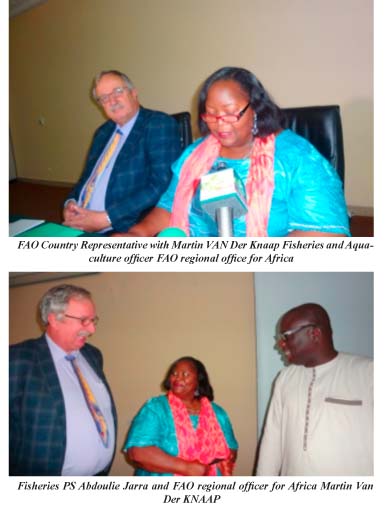
The FAO country representative made this statement while delivering a speech at the fisheries and aquaculture sector strategy validation meeting held recently at the Ocean Bay Hotel.
She expressed FAO’s satisfaction with the government of The Gambia for its firmed commitment towards the development of the fisheries and aquaculture sector, and food security.
The Gambia continues to face challenges to food security - including low productivity, high production costs, and a lack of modern techniques and technology, she said, adding that to overcome these challenges, food security has over the years stood out as the top government development priority .
In The Gambia, she added, the fisheries sector contributes to the national economy and livelihood of the population, with the potential to make a significant contribution to improved food security.
The fisheries sector contributes 12 per cent of the GDP, she stated.
The FAO country official further said that an estimated 200,000 people are directly or indirectly dependent on artisanal fisheries and its related activities for their livelihood.
“Fish and fisheries products are important ingredients of the diet in The Gambia, with estimated catches of 53,000 tonnes in 2015 from the artisanal sub sector.
“It is also an important source of income for those engaged in fish processing and marketing, many of whom are women.
“Global marine and inland fisheries, together with aquaculture provide food nutrition and a source of income to around 820 million people around the world, from production, processing, marketing and distribution.”
She also said that the sector offers a great opportunity for employment, economic benefits and is one of the major and cheapest sources of animal protein that contributes to improving dietary diversity and the nutritional status of the nation.
“A number of economic, social, institutional, physical and technical constraints are impeding the sustainable development, growth and management of the fisheries and aquaculture sectors,” she continued.
She applauded the government’s recent ratification of the IUU port state measures that was passed in The Gambia by the National Assembly.
This reflects best practices internationally and, if adhered to, would contribute significantly to the sustainable management of Gambia’s marine and inland fisheries resources.
The government recognises the need for a coherent strategy and associated action plan to address these challenges, and to support informed decision-making for policy, investments and programmes in the fisheries sector.
Despite the presence of the 2007 fisheries policy, the government recognises that there is limited information and data that would allow for a well-informed fisheries and aquaculture sectors development strategy.
It was against this background that government requested for FAO technical and financial support for the formulation of a fisheries and aquaculture sector action plan for 2015-2020.
FAO agreed to provide the support through a TCP facility project, which seeks to develop the fisheries and aquaculture sector through a comprehensive review of the entire fisheries and aquaculture sector, and development of the fisheries and aquaculture sector strategy and action plan.
The strategy is expected to contribute to the upcoming national development plan, the successor to the current PAGE, she added.
“The sector review and fisheries strategy will fill existing information gaps on the current and potential contribution of fisheries to food security and poverty eradication and economic development, and provide clear guidance to all actors in the sector, thus supporting decision-making.
“A clearly articulated fisheries and aqculture sector strategy will guide government, as well as the private sector, civil society, development partners and all actors in the Gambia’s fisheries and aquaculture sector in their decision making for policy, programme and investment choices, and will contribute significantly to the sustainable management and development of the sector.”
She added that the sustainable management of fisheries resources is an integral part of the realisation of the Programme for Accelerated Growth and Employment (PAGE) of the Gambia government.
In addition, she went on, the Agriculture and Natural Resources (ANR) policy and the Gambia National Agricultural Investment Programme (GNAIP) emphasis the importance of natural resources and fisheries, in particular, by pledging to sustainably improve the management and use of these resources.
The FAO country representative further stated that the project is also aligned with the AU/IBAR fisheries governance initiative, a Pan-Africa undertaking regarding, among other things, governance, small-scale fisheries and IUU fishing.
She thanked the Gambia government through the Ministry of Fisheries for the excellent relationship which FAO enjoys with its government partners, and reaffirmed their commitment to deepening collaboration and cooperation with the government and the people ofThe Gambia.

